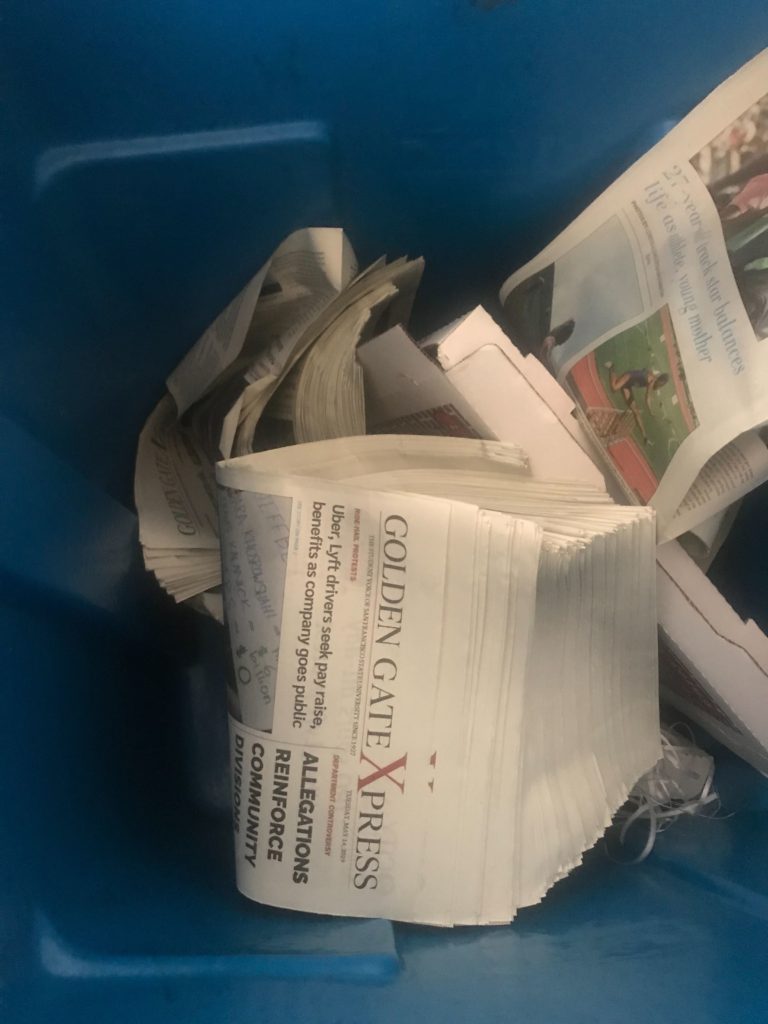Golden Gate Xpress newspapers were found in a trash can near the empty newspaper stand by Rm. 125 in the Humanities Building on May 15, 2019. (MONSERRATH ARREOLA/Golden Gate Xpress)
The May 14 and May 15 theft of more than 2,000 Xpress newspapers was an assault upon our independent student voice and an important
reminder of why free speech must be protected at all costs.
Unfortunately, this wasn’t the first time our work has been sabotaged. In early May 1997, an estimated 6,000 papers disappeared after reporting in Xpress (formerly Golden Gater) caused tensions with the Pan Afrikan Student Union (PASU).
Recently, the Xpress worked on a highly sensitive story and decided its newsworthiness was front-page material. Many people affected by the article tried to silence our publication with angry phone calls and emails, urging us not to run it at all.
Our editorial board decided to run the story in its entirety online with a shorter version for print. Reporter Geoff Scott and campus
news editor Julie Parker worked tirelessly on the article, staying up all night even after our paper was printed for distribution.
“A free press is the vanguard of a free society and democracy,” 1997 Editor-in-Chief of the Golden Gater Kevin Livingston said in an email to Xpress. “We live in an age [where] facts no longer matter if they offend. It is all feelings.”
The next morning our managing editor, Monserrath Arreola, discovered hundreds of Xpress newspapers in the trash. Although no one claimed responsibility for the incident, Xpress strongly suspects this was a retaliatory action carried out by persons who disagreed with our content.
University President Leslie Wong issued a statement May 20 regarding the incident: “The University does not condone censorship or suppression of news. Theft of the Golden Gate Xpress newspapers constitutes a crime, and as such, the University strongly condemns this
action.”
Back in 1997, Livingston filed a police report that named PASU leader Troy Buckner-Nkrumah, who allegedly admitted to “stealing the newspapers because they were upset about recent news coverage of their organization,” according to Gater coverage at the time.
Livingston told Xpress recent hostility and mistrust toward journalists reflects the importance of having a free press.
“Compared to today, 1997 seems like a golden age of journalism,” he said. “The USA under our current leadership has tried to erode
faith in a free press and history will tell you how scary that can be.”
As a student newspaper, we’ve had a rocky relationship with the University administration and various student organizations for reporting controversial stories and having perceived biases. While we try to “do no harm” to those we cover in our work, we absolutely refuse to
be intimidated by anyone.
A common misconception about our role as a student newspaper is that we are here to act as the mouthpiece for our sources. Objective journalism calls for us to take no sides, to do no favors and to report the truth without fear of retaliation.
“You don’t kill a story because you are afraid someone might get upset. If you do — change majors. Journalism takes guts and thick skin. Censorship is never acceptable under any circumstances,” Livingston said.
Censorship comes in many forms, but the ugliest form of all censorship is physically preventing free speech. When disagreements cannot be resolved peacefully through civil discourse, physical acts of censorship are inevitable and must be denounced by anyone who respects democracy.
One of the reasons we take this newspaper theft seriously is because journalists risk their lives to report the news and in some cases have
died doing so. According to the Committee to Protect Journalists, 54 journalists were killed last year worldwide.
And according to the U.S. Press Freedom Tracker, at least 10 journalists faced physical attacks this year alone. While these are extreme cases of censoring journalism, what happened on May 14 and May 15 is quite concerning to us given the hostility we face doing this job.
Journalism department Chair Cristina Azocar also issued a statement May 20: “The faculty of the San Francisco State Journalism Department condemns any act that impairs the activities of our free press or the distribution of its work. We expect the university and university police to conduct a full and thorough investigation and take steps to deliver justice in this illegal theft.”
Livingston said he views university campuses as “a microcosm of society” and in many autocratic regimes around the world, journalists have been locked up for doing their job.
“Journalists serve a purpose and if the truth makes you angry, you — or [the] subject — likely did something. It is not as if we are just making things up out of thin air,” Livingston said.
A free press is essential to preserving democracy and holding governments, organizations and individuals accountable for their actions. When censorship threatens true journalism, the news becomes propaganda and free speech no longer exists.
This post has been updated. A lower reference listed the date of the theft as March 14. The theft occurred May 14 and May 15. Xpress regrets this error.





![“As a member of the intelligence committee and the judiciary committee, she's been [Kamala Harris] in the middle of the most critical national security challenges our country faces,” Biden said at his first joint campaign event with Harris.(Sheila Fitzgerald / Shutterstock.com)](https://goldengatexpress.org/wp-content/uploads/2020/09/1486862834-huge-900x643.jpg)
